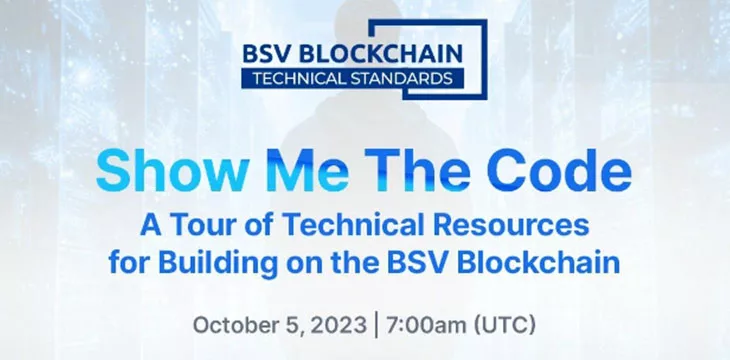|
Getting your Trinity Audio player ready...
|
In a recent webinar, James Belding, CEO of Tokenized, and Jack Davies, Senior Strategy Manager at nChain, provided a broad overview of the standards, protocols, key implementations, and services for developers in the BSV blockchain ecosystem. It was an eye-opening look at the resources available for those thinking about or actively building on the BSV blockchain.
Standards & protocols
First, Belding and Davies dive into the standards and protocols on the BSV blockchain network. There are links to more detailed information on these in each section.
BSV Wiki – Aim to provide correct and up-to-date information on the Bitcoin protocol, network, and its features and functionality. View the BSV Wiki here.
Merchant API (mAPI) – Is an additional service miners can offer to merchants, enabling them to get policy and fee quotes for submitting transactions and query their status. mAPI still works despite an intention to move to ARC as an alternative.
Paymail – A collection of protocols for BSV blockchain wallets that allow for a set of simplified user experiences to be delivered across all wallets in the ecosystem. For example, <alias>@<domain>.<tld>. Paymail is best thought of as an email-style addressing for Bitcoin wallets.
Metanet – The Metanet protocol is a layer two overlay protocol that defines a method for creating data structures over the BSV blockchain. It utilizes nodes and edges to specify directed acyclic graph (DAG) data structures on the BSV ledger. It can be used to construct file systems, internet domains, ownership structures, and code repositories.
Envelope Specification – This standard aims to provide a framework for specifying different protocols embedded in Bitcoin transactions. It aims to be agnostic to how data is stored in Script and supportive of all protocols and protocol identifiers. Learn more about the Envelope Specification here.
Peer Channels – These offer encrypted persistent messaging between BSV users, integrating offline and direct communications to enable the peer-to-peer interactions Satoshi described as fundamental to the Bitcoin network. Click the link to learn about Peer Channels.
To hear more about why these standards are important, how they work from a technical perspective, and more, check out the webinar via this link.
Key BSV blockchain implementations
Next, the pair looked at some of the key BSV blockchain implementations.
BSV Node is the node all BSV miners are using. It’s based on the original Bitcoin node software and doesn’t have the features BTC developers added on (e.g., SegWit). A new version of this, Teranode, will eventually supplant it and will be better due to the lessons learned from SV Node.
Tokenized Protocol is an application layer smart contract and token protocol. It was developed by Tokenized but has an open-source license. It’s primarily a smart contract platform, but tokens are a part of that. There’s much more information on Tokenized.com.
Bitcoin Reader is a light node that lets you read the traffic and transactions on the network. It’s something like a light node. Again, it’s open source and can be used for free.
sCrypt is a Typescript framework to write smart contracts on a Bitcoin Virtual Machine. It’s a high-level language much more like Javascript or Typescript, making it much more familiar and easy than Bitcoin’s native Script. Learn more about sCrypt here.
Tx Forge is a modern Bitcoin transaction builder. It’s capable of supporting any non-standard and custom script type. It’s built on the Nimble library.
BSVLIB is a BSV Python library. It has key management, digital signatures, standard script types, integrations with APIs, and more.
Services for Developers
To finish off, Belding and Davies look at the services available to developers.
WhatsOnChain is a block explorer. As well as being able to look up blocks and transactions, users can broadcast transactions directly (e.g., to test) and more. You can also access the API directly.
TAAL is a key miner in the space, but it also has a platform with various services for developers. As well as a wallet, there’s the STAS SDK, token service API, tools for managing transactions, and more.
Bitcoin analytics like BSVdata.com give a better view of what’s happening on an application level. This can help developers check on how successful their applications are in reality.
JungleBus is a powerful, low-level indexer to power lightweight Bitcoin data sets. It avoids having to keep a full copy of the blockchain or query a node every time. JungleBus was created by GorillaPool.
Bitails is a BSV archive, indexer, and UTXO manager that provides APIs, sockets, and other features for developers and companies working on the BSV blockchain.
HandCash Connect is an SDK that connects to an API. It gives developers access to a powerful, easy-to-use wallet-as-a-service. This is the reason so many successful BSV blockchain applications are connected to HandCash.
Relysia helps businesses process BSV blockchain payments. It’s a one-stop-shop in terms of API and SDK. They support many different applications in the BSV blockchain and have educational content useful to all developers.
Tokenized is a Smart Contracting platform-as-a-service as well as a wallet-as-a-service. It enables anyone to easily issue, manage, and trade digital assets and is based on the Tokenized protocol.
For more detailed technical explanations of these BSV blockchain technical resources and how they work, listen to the Show Me the Code webinar via the link above. Don’t forget to subscribe to CoinGeek for more webinars like this.
BSV entrepreneurs prove Bitcoin works with their applications: Calvin Ayre

 02-22-2026
02-22-2026 




